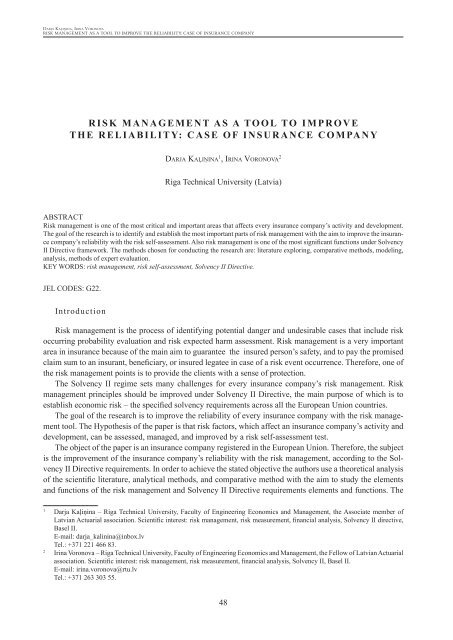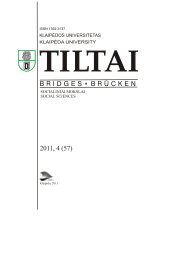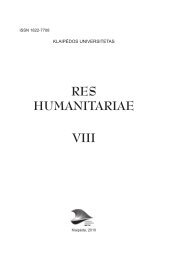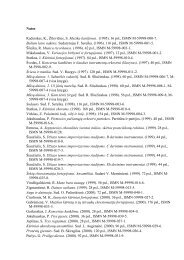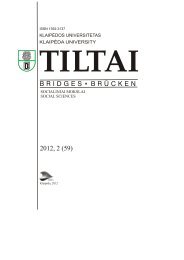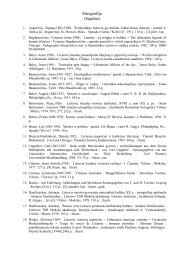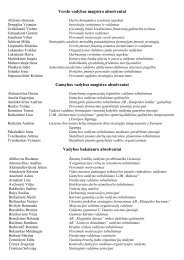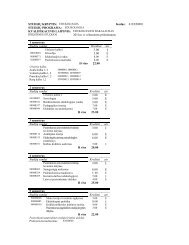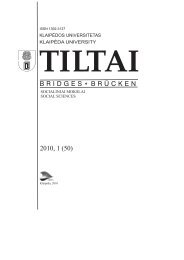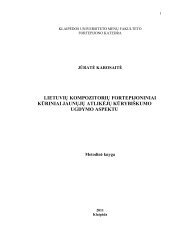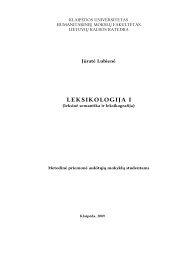regional formation and development studies - KlaipÄdos universitetas
regional formation and development studies - KlaipÄdos universitetas
regional formation and development studies - KlaipÄdos universitetas
You also want an ePaper? Increase the reach of your titles
YUMPU automatically turns print PDFs into web optimized ePapers that Google loves.
Darja Kaļiņina, Irina Voronova<br />
Risk management as a tool to improve the reliability: case of insurance company<br />
Risk management as a tool to improve<br />
the reliability: case of insurance company<br />
Darja Kaļiņina 1 , Irina Voronova 2<br />
Riga Technical University (Latvia)<br />
ABSTRACT<br />
Risk management is one of the most critical <strong>and</strong> important areas that affects every insurance company’s activity <strong>and</strong> <strong>development</strong>.<br />
The goal of the research is to identify <strong>and</strong> establish the most important parts of risk management with the aim to improve the insurance<br />
company’s reliability with the risk self-assessment. Also risk management is one of the most significant functions under Solvency<br />
II Directive framework. The methods chosen for conducting the research are: literature exploring, comparative methods, modeling,<br />
analysis, methods of expert evaluation.<br />
KEY WORDS: risk management, risk self-assessment, Solvency II Directive.<br />
JEL CODES: G22.<br />
Introduction<br />
Risk management is the process of identifying potential danger <strong>and</strong> undesirable cases that include risk<br />
occurring probability evaluation <strong>and</strong> risk expected harm assessment. Risk management is a very important<br />
area in insurance because of the main aim to guarantee the insured person’s safety, <strong>and</strong> to pay the promised<br />
claim sum to an insurant, beneficiary, or insured legatee in case of a risk event occurrence. Therefore, one of<br />
the risk management points is to provide the clients with a sense of protection.<br />
The Solvency II regime sets many challenges for every insurance company’s risk management. Risk<br />
management principles should be improved under Solvency II Directive, the main purpose of which is to<br />
establish economic risk – the specified solvency requirements across all the European Union countries.<br />
The goal of the research is to improve the reliability of every insurance company with the risk management<br />
tool. The Hypothesis of the paper is that risk factors, which affect an insurance company’s activity <strong>and</strong><br />
<strong>development</strong>, can be assessed, managed, <strong>and</strong> improved by a risk self-assessment test.<br />
The object of the paper is an insurance company registered in the European Union. Therefore, the subject<br />
is the improvement of the insurance company’s reliability with the risk management, according to the Solvency<br />
II Directive requirements. In order to achieve the stated objective the authors use a theoretical analysis<br />
of the scientific literature, analytical methods, <strong>and</strong> comparative method with the aim to study the elements<br />
<strong>and</strong> functions of the risk management <strong>and</strong> Solvency II Directive requirements elements <strong>and</strong> functions. The<br />
1<br />
Darja Kaļiņina – Riga Technical University, Faculty of Engineering Economics <strong>and</strong> Management, the Associate member of<br />
Latvian Actuarial association. Scientific interest: risk management, risk measurement, financial analysis, Solvency II directive,<br />
Basel II.<br />
E-mail: darja_kalinina@inbox.lv<br />
Tel.: +371 221 466 83.<br />
2<br />
Irina Voronova – Riga Technical University, Faculty of Engineering Economics <strong>and</strong> Management, the Fellow of Latvian Actuarial<br />
association. Scientific interest: risk management, risk measurement, financial analysis, Solvency II, Basel II.<br />
E-mail: irina.voronova@rtu.lv<br />
Tel.: +371 263 303 55.<br />
48


